
The Yellow Ticket is a 1914 Broadway play by dramatist Michael Morton, which premiered at the Eltinge 42nd Street Theatre in Manhattan on January 20, 1914. [1]

The Yellow Ticket is a 1914 Broadway play by dramatist Michael Morton, which premiered at the Eltinge 42nd Street Theatre in Manhattan on January 20, 1914. [1]
Anna Mirrel, a young Jewish girl in Czarist Russia, is forced to pretend to be a prostitute to obtain a prostitute's passport (a "yellow ticket") in order to visit her father, whom she believes to be ill. When she arrives in St. Petersburg, she learns that her father has been killed. She encounters a young journalist and tells him about injustices the government has kept him from learning about.

Julian Eltinge, born William Julian Dalton, was an American stage and film actor and female impersonator. After appearing in the Boston Cadets Revue at the age of ten in feminine garb, Eltinge garnered notice from producers and made his first appearance on Broadway in 1904. As his star began to rise, he appeared in vaudeville and toured Europe and the United States, even giving a command performance before King Edward VII. Eltinge appeared in a series of musical comedies written specifically for his talents starting in 1910 with The Fascinating Widow, returning to vaudeville in 1918. His popularity soon earned him the moniker "Mr. Lillian Russell" for the popular beauty and musical comedy star.

Albert Herman Woods was a Hungarian-born theatrical producer who spent much of his life in the USA. He produced over 140 plays on Broadway, including some of the most successful shows of the period, sometimes under the name of the production company 'Al Woods Ltd.'. Woods built the Eltinge Theatre on Broadway, named for one of his most successful and profitable stars, the female impersonator Julian Eltinge.

The Todd Haimes Theatre is a Broadway theater at 227 West 42nd Street in the Theater District of Midtown Manhattan in New York City. Built in 1918, it was designed by George Keister and developed by brothers Edgar and Archibald Selwyn, for whom the theater was originally named. The theater is owned by the city and state governments of New York and leased to New 42nd Street. It has 740 seats across two levels and is operated by Roundabout Theatre Company.
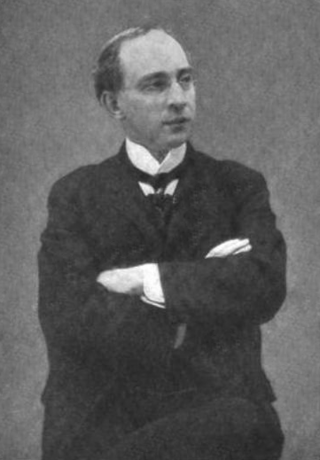
Michael Morton was an English dramatist in the early 20th century.

The Liberty Theatre is a former Broadway theater at 234 West 42nd Street in the Theater District of Midtown Manhattan in New York City. Opened in 1904, the theater was designed by Herts & Tallant and built for Klaw and Erlanger, the partnership of theatrical producers Marc Klaw and A. L. Erlanger. The theater has been used as an event venue since 2011 and is part of an entertainment and retail complex developed by Forest City Ratner. The theater is owned by the city and state governments of New York and leased to New 42nd Street. Brookfield Asset Management, which acquired Forest City in 2018, subleases the venue from New 42nd Street.

The Yellow Ticket is a 1931 pre-Code American drama film based on the 1914 play of the same name by Michael Morton, produced by the Fox Film Corporation, directed by Raoul Walsh, and starring Elissa Landi, Lionel Barrymore and Laurence Olivier. Boris Karloff appears briefly in a small supporting role. The picture is also a noteworthy example of productions from the pre-Code era in that it includes brief nudity.

The Woman and the World is a 1916 American silent drama film starring Jeanne Eagels as a prostitute who seeks a second chance in the countryside. It was based on the 1914 play Outcast starring Elsie Ferguson. It was remade in 1922 as Outcast, starring Ferguson; in 1928 with Corinne Griffith, also titled Outcast; and with Bette Davis in 1935 as The Girl from 10th Avenue.
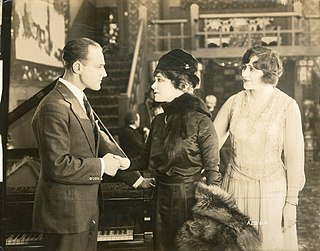
The Song of Songs is a 1918 American silent drama film produced by Famous Players–Lasky and based on a 1914 stage play version by Edward Sheldon of the 1908 novel by Hermann Sudermann, The Song of Songs. This picture was directed by Joseph Kaufman and stars Elsie Ferguson. This was Kaufman's last film before his death on February 1, 1918, very early on during the 1918 flu pandemic.

Lily of the Dust is a 1924 American silent drama film directed by Dimitri Buchowetzki, starring Pola Negri, produced by Famous Players–Lasky, and distributed by Paramount Pictures. This movie was based on the 1908 novel The Song of Songs by Hermann Sudermann and the 1914 Broadway play The Song of Songs by Edward Sheldon.

The Love Racket is a 1929 American early sound crime drama film produced and distributed by First National Pictures. It was directed by William A. Seiter and starred Dorothy Mackaill. It is based on a Broadway play, The Woman on the Jury by Bernard K. Burns, and is a remake of a 1924 silent film of the same name which starred Bessie Love. The film is now considered lost.

The Yellow Passport is a lost 1916 silent film drama produced and distributed by the World Film Company. Based on Michael Morton's 1914 Broadway play of the same title, it was directed by Edwin August and starred Clara Kimball Young. On the stage the lead characters were played by Florence Reed and John Barrymore. Morton's story was filmed several times in the silent era and made as The Yellow Ticket in 1931 with Lionel Barrymore and Elissa Landi.
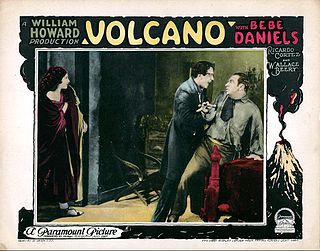
Volcano! is a 1926 American silent drama film directed by William K. Howard and starring Bebe Daniels, ricardo Cortez, and Wallace Beery. The picture was produced by Famous Players–Lasky and distributed by Paramount Pictures. It is based on a 1920 Broadway play Martinique by Laurence Eyre. It is preserved in the Library of Congress, UCLA Film and Television Archives, and The Museum of Modern Art.
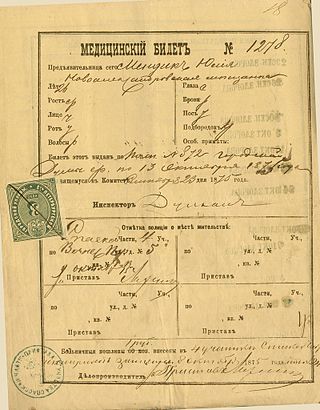
Yellow ticket, yellow passport or yellow card was an informal name of a personal identification document of a prostitute in the Russian Empire between 1843 and 1909. The document combined an ID card, a residence permit, a license to practice prostitution, and prostitute's medical check-up card. The official title of the document varied: medical card, replacement card, etc. The title "replacement card" refers to the fact that upon registration, the prostitute left her original passport or residence permit in the local police office and was issued the "yellow card" as a replacement personal ID. The carriers of the card were subject to periodic medical check-ups. This requirement was dropped in 1909.
Yellow ticket is a prostitute ID card in Russian Empire

The Empire Theatre is a former Broadway theater at 234 West 42nd Street in the Theater District of Midtown Manhattan in New York City. Opened in 1912, the theater was designed by Thomas W. Lamb for the Hungarian-born impresario A. H. Woods. It was originally named for female impersonator Julian Eltinge, a performer with whom Woods was associated. In 1998, the building was relocated 168 feet (51 m) west of its original location to serve as the entrance to the AMC Empire 25, a multiplex operated by AMC Theatres, which opened in April 2000.

Cheating Cheaters is a 1927 American silent comedy crime film produced and distributed by Universal Pictures. It was directed by Edward Laemmle and starred Betty Compson. This film was based on a 1916 Broadway play of the same name by Max Marcin.
Cheating Cheaters is a 1916 play written by Max Marcin. Producer A. H. Woods staged it on Broadway. The play is a melodramatic farce about two groups of jewel thieves who are each posing as a wealthy family in order to rob the other.
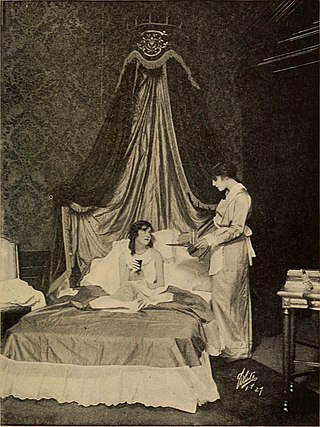
The Song of Songs is a 1914 play written by Edward Sheldon, based on the 1908 German novel Das hohe Lied by Hermann Sudermann, which had been translated to English under the title The Song of Songs. Producer A. H. Woods staged the play on Broadway at his Eltinge 42nd Street Theatre, where it was a box office success. The play was the basis of several movie and radio adaptations.

The Yellow Ticket is a 1918 American silent drama film directed by William Parke and starring Fannie Ward. It is based on Michael Morton's 1914 play The Yellow Ticket. This screen adaptation of the play is currently classified as a lost film.

Up in Mabel's Room is a play written by Wilson Collison and Otto Hauerbach. Producer Albert H. Woods staged it on Broadway in 1919.